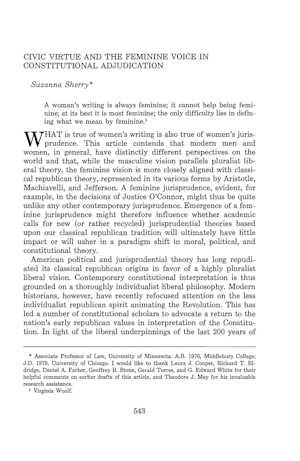Civic Virtue and the Feminine Voice in Constitutional Adjudication
January 2, 1986

DISCLAIMER: This text has been transcribed automatically and may contain substantial inaccuracies due to the limitations of automatic transcription technology. This transcript is intended only to make the content of this document more easily discoverable and searchable. If you would like to quote the exact text of this document in any piece of work or research, please view the original using the link above and gather your quote directly from the source. The Sandra Day O'Connor Institute does not warrant, represent, or guarantee in any way that the text below is accurate.
Article Text
(Excerpt, Automatically generated)
CIVIC VIRTUE AND THE FEMININE VOICE IN CONSTITUTIONAL ADJUDICATION
Suzanna Sherry*
A woman's writing is always feminine; it cannot help being femi nine; at its best it is most feminine; the only difficulty lies in defm ing what we mean by feminine. 1
W
HAT is true of women's writing is also true of women's juris prudence. This article contends that modern men and women, in general, have distinctly different perspectives on the world and that, while the masculine vision parallels pluralist lib eral theory, the feminine vision is more closely aligned with classi cal republican theory, represented in its various forms by Aristotle, Machiavelli, and Jefferson. A feminine jurisprudence, evident, for example, in the decisions of Justice O'Connor, might thus be quite unlike any other contemporary jurisprudence. Emergence of a fem inine jurisprudence might therefore influence whether academic calls for new (or rather recycled) jurisprudential theories based upon our classical republican tradition will ultimately have little impact or will usher in a paradigm shift in moral, political, and
constitutional theory.
American political and jurisprudential theory has long repudi ated its classical republican origins in favor of a highly pluralist liberal vision. Contemporary constitutional interpretation is thus grounded on a thoroughly individualist liberal philosophy. Modern historians, however, have recently refocused attention on the less individualist republican spirit animating
